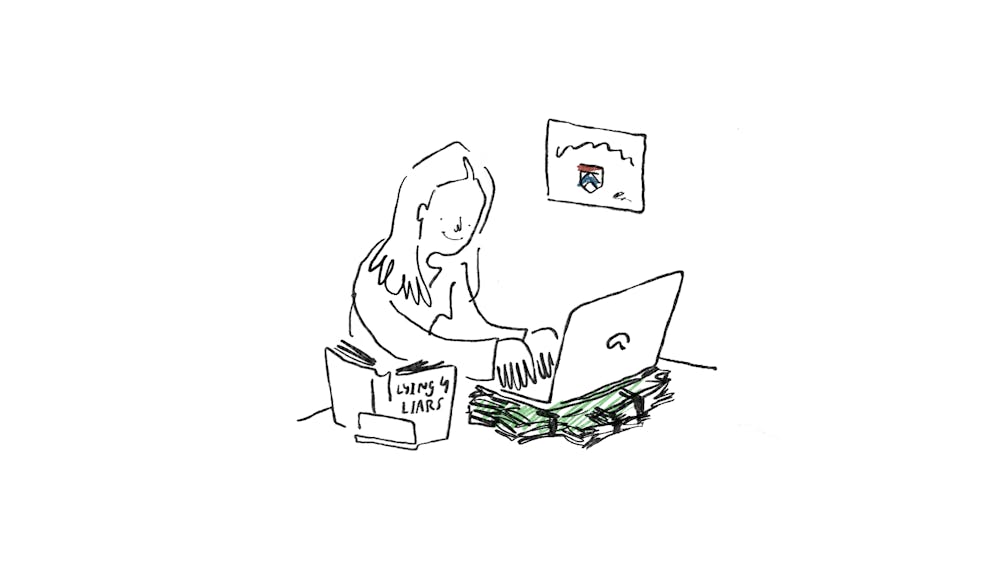
If you’ve already forgotten who Charlie Javice is, you shouldn’t worry too much. The college microfinance pioneer, turned FAFSA entrepreneur, turned managing director of JPMorgan, had quite the fall from grace last month. However, she can hardly bring more infamy upon her alma mater, the University of Pennsylvania, than household-name alumni like Donald Trump and Elon Musk.
Plus, poor Javice has to compete for the title of most outrageous act of deception with all the schmucks who tried lying their way into Penn. Saying your product is used by students at an impossibly large number of colleges is blatant, but it faces some stiff competition from the case of the Choi sisters, who allegedly plagiarized their way into the Penn dental program. And that’s not to mention Penn’s own fraudulent athletic-recruiting case.
It’s no surprise that Penn keeps ending up in scandals like this. Charlie Javice and her ilk want a quick ticket to millions, with a side of something to brag about to their Wall Street acquaintances. Penn gives them that; in return, it gets a handful of these wrongdoers among more garden-variety braggarts, prestige hounds, and dollar-obsessed dealers.
Penn’s admissions website, thankfully, avoids talking too much about students’ pecuniary motives for seeking out Locust Walk. But students have still inherited the idea, passed around by parents and peers, that certain industries (finance, consulting, medicine) and certain universities (mostly the Ivy League) combine to form a ticket to the one percent. It’s not entirely clear that going to the Ivy League increases earnings for the average student, but Penn’s top-ranked undergraduate business school and a generally highly rated undergraduate education make it a magnet for the Charlie Javices of the world.
While Penn manages to avoid screaming about the salaries of their alumni from every rooftop, it has none of that shame when it comes to touting their prestige. Its Ivy League association is everywhere from its Instagram bio to the salad place in Houston Market. It enthusiastically cozies up to President Biden. And alumni who have experienced career success, typically financial, are praised and rewarded with a spot on the Board of Trustees. Still, even if Penn stopped talking itself up, the idea of a Penn education as a stamp of quality would endure in the boardrooms of investment banks. This signal and the promise of financial benefits result in students with more monetary drive than ethics eagerly writing their "Why Penn" essays.
Meanwhile, Penn has reached a state of coexistence with the immoral behavior of its students and alumni, whether it realizes it or not. Like every institution, Penn is proud when people associated with it do impressive things. Penn-associated endeavors boosted Charlie Javice uncritically. Her seemingly inactive microfinance startup PoverUP gave her supposed credentials in the language of social impact that Penn dutifully mentioned in their quest to gain more prestige.
Combine this with a college admissions process that discourages modesty and lets people with less moral inhibitions get ahead, and Penn has a great recipe for accepting students who will later prove to embarrass it. Until college admissions aren’t vulnerable to essays written by others or journals that legitimize plagiarized work, students who would rather cheat their way to success than earn it will continue to have joyous Ivy Days.
Luckily, most students at Penn aren’t morally twisted; Javice is an outlier, albeit an impactful one, among the denizens of this campus. Even those who prize joining the über-rich tend to also have at least a little care for those who do not enjoy that exalted status. But what’s more common is that students become acclimated to seeking riches over following their moral compass, seeing people like Javice treat social impact like a smokescreen covering their desire for cushy corporate jobs.
The evidence for this on campus is clear. Almost 50% of Penn grads who were quickly in full-time employment went into finance or consulting. Penn does not release the number of students who apply to transfer to Wharton, but it’s clear that the movement is in the direction of the business school. That’s good if they discovered a passion for business, but not if they feel pressured to keep up with the future McKinseyites of this campus. Worse yet, when students see others, such as Javice until recently, cheat and get away with it, that makes them more likely to cheat.
It’s too late to reverse the actions of Charlie Javice, but Penn has the power to prevent unjust behavior. Dramatic changes, such as having freshmen complete a year at Penn before applying into a specific school here, would make a difference, but more doable solutions are at hand. For example, Penn could stop creating unwarranted prestige by dropping out of the U.S. News & World Report undergraduate rankings, reducing the Ivy League branding, and owning up to their role in boosting the career of Javice and similar fraudsters through its alumni network. Penn could also increase the punishments for students found to have committed fraud in their college application or classes.
All in all, the fall of Charlie Javice holds a mirror up to the problems with a Penn education. Every member of the Penn community, myself very much included, is complicit in the environment here, where whether you will rake in millions matters more than whether you will help others. While most of us aren’t building companies out of pure deception, the entire Ivy League prestige machine relies on people like you and me buying into the pursuit of Wall Street’s mammon.
BENJAMIN McAVOY-BICKFORD is a College first year from Chapel Hill, NC. His e-mail is bmcavoyb@sas.upenn.edu.
The Daily Pennsylvanian is an independent, student-run newspaper. Please consider making a donation to support the coverage that shapes the University. Your generosity ensures a future of strong journalism at Penn.
Donate



